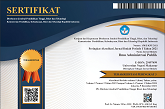The Effectiveness of the Disaster Resilient Village Program by the Local Disaster Management Agency
(1) Universitas Muhammadiyah Sukabumi
(2) Universitas Muhammadiyah Sukabumi
(3) Universitas Muhammadiyah Sukabumi
(*) Corresponding Author
DOI: https://doi.org/10.26858/jiap.v13i1.47063
Abstract
Disaster Resilient Village is a manifestation of the government's responsibility to provide protection to the community from the threat of disaster. The purpose of this research is to find out how effective the Disaster Resilient Village program by the Sukabumi City Regional Disaster Management Agency is. This research uses Duncan's theory. This research method uses qualitative research methods. Data collection techniques used observation, interviewing, and documentation techniques. Data validation methods used were source triangulation, technique triangulation, and time triangulation. The data analysis used is from Miles and Huberman, using data reduction, data presentation, and drawing conclusions and verification. The results of this study indicate that the Disaster Resilient Village program has been running in accordance with the established regulatory guidelines, but its implementation is still not running effectively, as there should be empowerment for the village to upgrade the criteria class of the village as stated in the Regulation of the Head of the National Disaster Management Agency Number 2 of 2012 regarding the implementation of the Disaster Resilient Village program, and the facilities and infrastructure are also not enough to maximize the workforce in supporting the Disaster Resilient Village program.
Keywords
Full Text:
PDFReferences
Alazawi, Z., Alani, O., Abdljabar, M. B., Altowaijri, S., & Mehmood, R. (2014). A smart disaster management system for future cities. In Proceedings of the 2014 ACM international workshop on Wireless and mobile technologies for smart cities - WiMobCity ’14. ACM Press. https://doi.org/10.1145/2633661.2633670
Belel, Z. A., Belel, W. A., Abubakar, M. H. M. H., Ahmed, Z. B., Daud, Z., & Awang, H. (2018). Socio-Economic Development of Transportation in Fufore, Nigeria. International Journal of Integrated Engineering, 10(8).
Cesário, F., & Magalhães, S. (2017). Human Resources Management, Citizenship Behavior, and Turnover Intention in the Portuguese Public Administration. International Journal of Public Administration, 40(11), 979–988. https://doi.org/10.1080/01900692.2016.1242609
Cioccio, L. (2007). Hazard or disaster: Tourism management for the inevitable in Northeast Victoria. Tourism Management, 28(1), 1–11. https://doi.org/10.1016/j.tourman.2005.07.015
Creswell, J. W., & Creswell, J. D. (2017). Research design: Qualitative, quantitative, and mixed methods approaches. Sage publications.
Duncan, R. B. (1973). Multiple Decision-making structures in adapting to environmental uncertainty: The impact on organizational effectiveness. Human Relations, 26(3), 273–291.
Elvas, L. B., Gonçalves, S. P., Ferreira, J. C., & Madureira, A. (2022). Data Fusion and Visualization towards City Disaster Management: Lisbon Case Study. In EAI Endorsed Transactions on Smart Cities (Vol. 6, Issue 18). European Alliance for Innovation n.o. https://doi.org/10.4108/eetsc.v6i18.1374
Ghaffarian, S., Roy, D., Filatova, T., & Kerle, N. (2021). Agent-based modelling of post-disaster recovery with remote sensing data. International Journal of Disaster Risk Reduction. https://doi.org/10.1016/j.ijdrr.2021.102285
Ha, K.-M. (2020). Rank-Oriented Disaster Management: The Korean Experience. International Journal of Public Administration, 43(10), 839–849. https://doi.org/10.1080/01900692.2019.1660988
Hermansson, H. (2019). Challenges to Decentralization of Disaster Management in Turkey: The Role of Political-Administrative Context. International Journal of Public Administration, 42(5), 417–431. https://doi.org/10.1080/01900692.2018.1466898
Khatoon, S., Asif, A., Hasan, M. M., & Alshamari, M. (2022). Social Media-Based Intelligence for Disaster Response and Management in Smart Cities. In Springer Optimization and Its Applications (pp. 211–235). Springer International Publishing. https://doi.org/10.1007/978-3-030-84459-2_11
Miles, M. B., Huberman, A. M., & Saldana, J. (2014). Qualitative Data Analysis: A Methods Sourcebook (3rd ed.). Sage Publications.
Mitroff, I. I. (1994). Crisis Management and Environmentalismi A Natural Fit. California Management Review, 36(2), 101–113. https://doi.org/10.2307/41165747
Putra, D. I., & Matsuyuki, M. (2019). Disaster Management Following Decentralization in Indonesia: Regulation, Institutional Establishment, Planning, and Budgeting. J-STAGEトップ/Journal of Disaster Research, Vol.14 No., 173–187.
Räsänen, A., Lein, H., Bird, D., & Setten, G. (2020). Conceptualizing community in disaster risk management. International Journal of Disaster Risk Reduction, 45, May 20, 1–8.
Smith, G., & Ariyachandra, T. (2022). BI and Analytics for Effective Disaster Recovery Management Lessons From the Bayou. In Advances in Business Information Systems and Analytics (pp. 197–217). IGI Global. https://doi.org/10.4018/978-1-7998-4799-1.ch007
Sugiyono. (2016). Metodologi Penelitian Kuantitatif, Kualitatif, dan R&D. In CV Alfabeta. https://doi.org/https://doi.org/10.3929/ethz-b-000238666
Sugiyono, prof. D. (2019). metode penelitian kuantitatif, kualitatif, dan R&D. alfabeta : bandung.
Thaha, R., & Drajat, U. Z. (2023). The Analysis of Post-Flood Disaster Management at North Luwu Regency. International Journal Papier Public Review, Vol. 4 No., 51–59.
Wamsler, C., & Johannessen, Å. (2020). Meeting at the crossroads? Developing national strategies for disaster risk reduction and resilience: Relevance, scope for, and challenges to, integration. International Journal of Disaster Risk Reduction, 45, May 20, 1–8.
Article Metrics
Abstract view : 77 times | PDF view : 13 timesRefbacks
- There are currently no refbacks.
Copyright (c) 2023 Rismawati Agusti, Andi Mulyadi, M. Rijal Amirulloh

This work is licensed under a Creative Commons Attribution 4.0 International License.
Diterbitkan oleh:
Program Studi Ilmu Administrasi Publik
Program Pascasarjana Universitas Negeri Makassar
JIAP Index By:

This work is licensed under a Creative Commons Attribution 4.0 International License.









